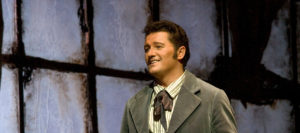
5 Facts About Piotr Beczala’s Relationship To Wagner’s Music
By Logan MartellThis summer Piotr Beczala is set to return to the Bayreuth Festival to reprise the title role in Wagner’s “Lohengrin.” Performances are set to reunite the tenor with Anna Netrebko and Christian Thielemann.
Back in January, the tenor sat down with the Wagner Society of New York to talk about the famed composer and performing with Anna Netrebko. Here are five things we learned about the tenor and how he feels about his future with Wagner.
1. Patience is What Allows a Career to Advance
“I think this allowed me to build my way up from the bottom, because I was always thinking about what the next step was. Sometimes that meant concert and recitals out of town, or guest performances in Europe – nothing big, just starting out – and I think sometimes it depends on a person’s attitude.
“You have two choices: singing in a small opera house and doing the big roles, or singing in a big opera house and doing the small roles, where you have a chance to move onto larger roles. Probably the most important word for young singers would be ‘patience.’ If you are good, and you learn how to sing, and you take your time, you will get there; a career is a result of what you are doing, not your goal, and that’s the most important thing.”
2. Wagner can be dangerous for the voice.
“Even in something like ‘Lohengrin,’ which is not really a Wagner opera in the usual sense, it is very difficult to sing. When you see how much energy is needed, and how precise one’s technique needs to be, all in order to sell the text to the audience, it’s not always the easiest thing. You have to be very careful not to go too far. In my time as a student, I sang with people who were great singers, and they did not have many problems, but they often were forcing themselves or singing over what was needed. It can be very difficult because there are so many components. For roles like ‘Siegfried’ or ‘Tannhäuser’ you really need to have the voice for it; you can’t sing Tristan with a Tamino voice.”
3. Beczala Initially Reject “Lohengrin”
“Well the story is rather long, because it started six or seven years ago when I started singing in Dresden… I was asked if I wanted to do this role and I was curious, and a little scared. I said ‘Well, you know, I have a lot of things on my schedule, and I don’t feel I understand the work well enough to do this.’
“A year later, we had the same conversation, and this time he saw that I was being careful so he began talking to my wife. Which was very smart… Eventually, I said ‘Look, I’ll learn it a little bit, but I don’t think I will be able to study it as I prepare for new roles that I have coming up.’ We met a few times and I began to try to see Lohengrin as a character. After two and a half hours of singing, we changed a few things, then after another hour of singing I got the feeling there could be something.
“Things happened, and I ended up doing the role in the production in Bayreuth, and I’m very happy about that because I became invested in the role. Over the next three or four years, I will have quite a few performances of ‘Lohengrin.’ We have quite a few plans and, well, I like the opera.”
4. Anna Netrebko Worked With Beczala Before Arriving in Dresden
“She’s just a fantastic singer and a complete artist. Many people see the red carpets, champagne, the posts on Facebook, and this is how they perceive her, but I got to see the woman beneath this surface. ‘Lohengrin’ is not the sort of work she normally does, it was very new for her as she had not sung anything in German before apart from some lieders, and it was huge work.
“When we first started rehearsing, and I knew she was in Vienna, I called her saying ‘Let’s do some rehearsals. I have my pianist here and we’ll see how things go.’ And I did hear some panic in her voice. When we ran through it, she had maybe 40 percent of Elsa down. She is extremely gifted at learning opera but this was not her usual thing. We had seven-hour rehearsal days, and she never marked. She sang Elsa for seven hours a day with full voice, and in a way, it was heroic.
5. Another Wagner Role is Coming
“I don’t want to sacrifice my French, Italian, and Slavic repertory, and I have never seen myself as a Wagnerian tenor. I would be a tenor who sings Wagner, but there’s an exact kind of voice and style that is needed to be a Wagnerian tenor. My voice is so far away from what is required. I am still talking to some conductors of opera houses.
“About three years ago I was presented with a really nice idea for ‘Meistersinger.’ It’s a masterpiece, but the role of Walther von Stolzing is perhaps not one of the best tenor roles, but the work itself is a masterpiece and there’s so much that happens musically. In my point of view, I am not ready for ‘Meistersinger,’ but one of the works for which there is a strong possibility of doing is ‘Parsifal’ in 2022. But first I have to really be certain that it fits well. It’s really a difficult role, because it’s more a question of finding the way to understand – because it’s Wagner’s last opera.”
Categories
Special Features

